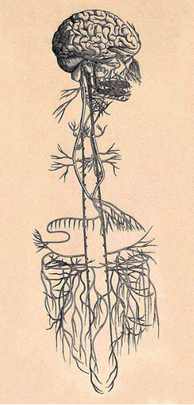 The Vagus Nerve is the longest cranial nerve in your body. Vagus means “wanderer” in Latin, which accurately represents how the nerve wanders all over the body and reaches various organs. The Vagus Nerve is also a key part of your parasympathetic “rest and digest” nervous system. It influences your breathing, digestive function and heart rate, all of which can have a significant impact on your mental health. It’s important to increase the “tone” of your vagus nerve, as having a higher vagal tone means that your body can relax faster after stress. In 2010, researchers discovered a positive feedback loop between high vagal tone, positive emotions, and good physical health. So the more you increase your vagal tone, the more your physical and mental health will improve. Studies have shown that vagal tone is passed on from mother to child. Mother’s who are depressed, anxious and angry during their pregnancy have lower vagal activity. Once they give birth, the newborn also has low vagal activity and low dopamine and serotonin levels. Don’t worry if you think you might have a low vagal tone! You can take steps to increase it by stimulating your vagus nerve. This will allow you to more effectively respond to the emotional and physiological symptoms of your brain and mental illness. By stimulating your vagus nerve you can help treat mental health conditions such as depression and anxiety. So how does one stimulate their vagus nerve? Look at the list below! 1. Cold Exposure Researchers have found that exposing yourself to cold on a regular basis can lower your sympathetic “flight or fight” response and increase parasympathetic activity through the vagus nerve. Try finishing your next shower with at least 30 seconds of cold water and see how you feel. Slowly work your way up to longer periods of that cold-water blast. The lingering effects are worth it! 2. Deep and Slow Breathing Most people take about 10 to 14 breaths each minute. Taking about 6 breaths over the course of a minute is a great way to reduce stress. You should breath in deeply from your diaphragm. When you do this, your stomach should expand outward. Your exhale should be long and slow. This is the key to stimulating the vagus nerve and reaching a state of relaxation. 3. Singing, Humming, Chanting and Gargling The vagus nerve is connected to your vocal cords and the muscles at the back of your throat. Singing, humming, chanting and gargling can activate these muscles and stimulate your vagus nerve. This has been shown to increase heart-rate variability and vagal tone. 4. Meditation Research shows that meditation increases vagal tone and positive emotions and promotes feelings of goodwill towards you. Another study found that meditation reduces sympathetic “flight or fight” activity and increases vagal modulation. “OM” chanting, which is often done during meditation, has also been shown to stimulate the vagus nerve. 5. Exercise Not only does exercise help reverse cognitive decline but it’s also been shown to stimulate the vagus nerve, which may explain its beneficial brain and mental health effects. Walking, weighlifting and sprinting are the best forms of exercise but you should do what you enjoy so that you will maintain it consistently. 6. Socializing and Laughing Reflecting on positive social connections improves vagal tone and increases positive emotions. Laughter has been shown to increase heart rate variability and increase mood. And vagus nerve stimulation often leads to laughter as a side effect, suggesting their connection. So laugh with your friends as much as possible! Conclusion By stimulating the vagus nerve, you can send a message to your body that it’s time to relax and de-stress, which leads to long-term improvements in mood, wellbeing and resilience. So give some of the above suggestions a try and see if you can overcome some of the depression and anxiety that arise. http://pss.sagepub.com/content/early/2013/05/06/0956797612470827.abstract www.ncbi.nlm.nih.gov/pubmed/22894892 I am a licensed Marriage & Family Therapist who can provide services with anyone who resides in the State of California. I have also been trained in Clinical Hypnotherapy which is beneficial for more specific goals. Liz Birch, LMFT, CHt ~ 714-584-6047 ~ [email protected]
2 Comments
Douglas Hooper
10/23/2019 06:04:29 am
As a retired EMT and Deputy Coroner, I have witnessed several older persons, when bearing down on the toilet, over stimulate their Vegas Nerve causing a fatally low heart rate. Conversely, a non-invasive treatment for tachycardia is to bear down...Thank you for the education...
Reply
Ah, that's very true! I wonder if better education is needed, by physicians, for those with slower heart rates to be careful bearing down (not just on the toilet). I'm not sure. I have First Responders in my family and they have told me the same as you just did. Thanks for commenting about that!
Reply
Your comment will be posted after it is approved.
Leave a Reply. |
|

 RSS Feed
RSS Feed